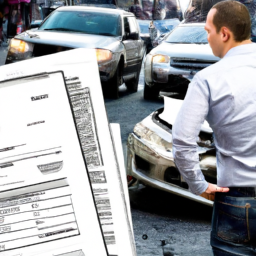Did you know that there were over 200,000 auto collisions reported in New York City last year? If you find yourself involved in one of these accidents, it’s important to know how to handle your insurance claim. In this guide, we will walk you through the steps to take after an auto collision in NYC. First, gather all the essential information, such as the other driver’s details and any witness accounts. Then, contact your insurance company as soon as possible to report the accident. Don’t forget to document the damages and injuries by taking photos and keeping all relevant paperwork. Lastly, if necessary, file a police report and seek legal advice to ensure your rights are protected.
Gather Essential Information
Gather all the necessary information to ensure a smooth insurance claims process after an auto collision in NYC. Contacting witnesses and obtaining medical records are crucial steps to take in handling your insurance claim effectively.
When it comes to contacting witnesses, make sure to gather their contact information, including their names, phone numbers, and addresses. It is essential to reach out to any individuals who witnessed the accident and obtain their statements regarding what they saw. These witness testimonies can provide valuable evidence to support your claim and establish liability.
Obtaining medical records is equally important. Seek medical attention immediately after the accident, even if you believe your injuries are minor. Request copies of all medical records related to the collision, including examination reports, diagnostic tests, and treatment plans. These records will serve as crucial evidence to support your claim for any medical expenses or damages resulting from the accident.
Contact Your Insurance Company
To initiate the insurance claims process after an auto collision in NYC, you need to promptly contact your insurance company. It is crucial to notify your insurer as soon as possible to ensure that you receive the necessary coverage for your claim. When contacting your insurance company, have all the relevant information on hand, such as your policy number, the date and time of the accident, and any details about the other parties involved. This will help expedite the claim process and ensure that you receive the assistance you need.
When speaking with your insurance company, be concise and provide them with accurate information about the accident. Describe the events leading up to the collision and any damages sustained to your vehicle. It is important to be honest and transparent throughout the process to avoid any potential issues with your claim.
Your insurance company will guide you through the claim process and may require additional documentation, such as police reports or repair estimates. They will assess the damages and determine the coverage based on your policy.
Remember to keep records of all communication with your insurer, including emails and phone calls. This will help you stay organized and provide evidence if any disputes arise during the claims process.
Document the Damages and Injuries
Take detailed photographs and collect relevant information about the damages and injuries sustained in the auto collision. This step is crucial in ensuring that you have proper documentation to support your insurance claim. Start by taking photographs of the damage to your vehicle from different angles, capturing any visible dents, scratches, or broken parts. Make sure to include close-up shots of any specific areas that were impacted. Additionally, photograph evidence of injuries, such as bruises, cuts, or any visible signs of harm. These photographs will serve as visual proof of the extent of the damages and injuries you suffered.
In addition to photograph evidence, it is essential to gather medical records related to the injuries sustained in the collision. This includes any documents from hospitals, doctors, or other medical professionals who treated you. These records should detail the nature and extent of your injuries, as well as any treatments or medications prescribed.
File a Police Report
After an auto collision in NYC, it is important that you promptly report the incident to the police. Filing a police report is crucial for several reasons. First and foremost, it provides an official record of the accident, which can be essential when filing an insurance claim. The report contains important details such as the date, time, and location of the collision, as well as the parties involved and any witnesses present. This information helps establish the facts of the accident and determine liability.
However, there can be challenges when filing a police report. In some cases, the police may not respond immediately, especially if there are no injuries or the accident is minor. This delay can pose difficulties when it comes to filing an insurance claim, as insurers often require a police report as part of the claims process. It is important to be persistent and follow up with the police department to ensure that your report is filed in a timely manner.
Seek Legal Advice, if Necessary
If you require legal advice, consult with an attorney to ensure you fully understand your rights and options. Seeking legal advice is crucial in navigating the complex process of handling insurance claims after an auto collision in NYC. Here are some reasons why you may need to seek legal consultation:
-
Understanding liability determination: A lawyer can help you understand how liability is determined in your case. They can review the evidence, assess the circumstances of the collision, and advise you on your chances of recovering damages.
-
Assessing insurance coverage: An attorney can review your insurance policy and determine the extent of coverage available to you. They can help you maximize your claim and ensure that you receive fair compensation for your losses.
-
Negotiating with insurance companies: Insurance companies are notorious for offering low settlements. A lawyer can negotiate with the insurance company on your behalf, ensuring that you are not taken advantage of and helping you achieve a fair resolution.
-
Filing a lawsuit, if necessary: In some cases, insurance claims may not be sufficient to cover your damages. A lawyer can help you file a lawsuit against the at-fault party, seeking additional compensation for your injuries and losses.
-
Protecting your rights: An attorney will work diligently to protect your rights throughout the claims process. They can handle all communication with the insurance company, gather evidence, and advocate for your best interests.



